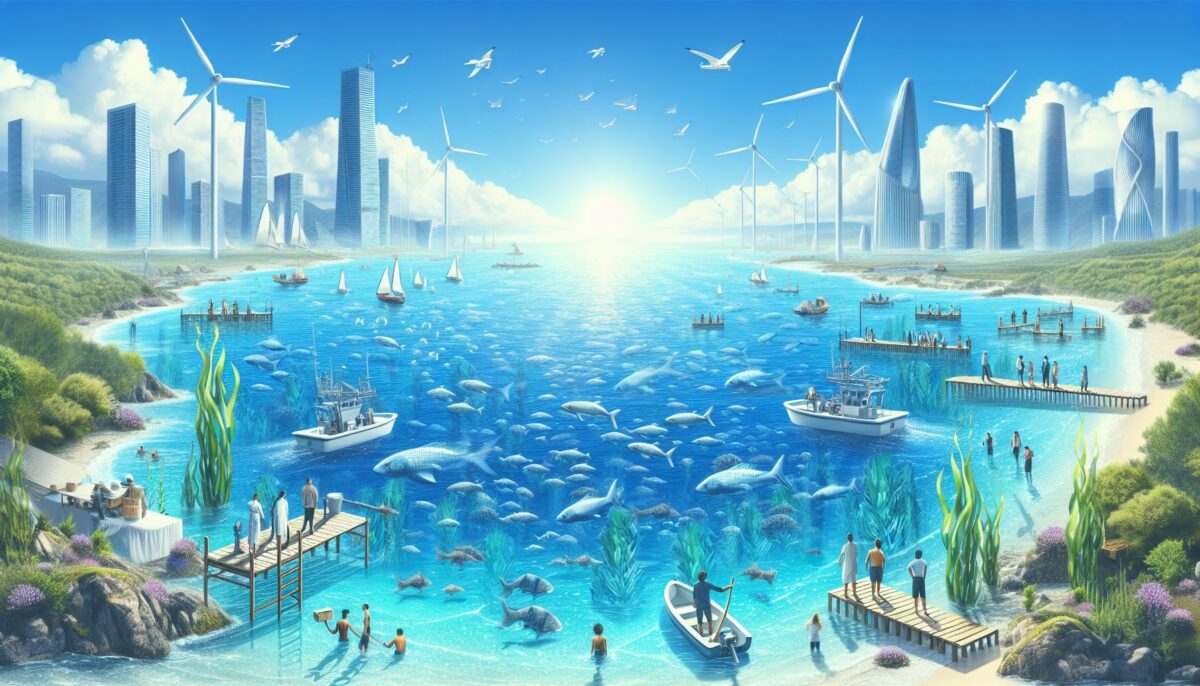The oceans of this planet not only mark boundaries—they also represent boundless opportunities. Propellers of the economy, drivers of innovation, and engines of sustainable growth, the oceans play a pivotal role in the world today. This concept is aptly encapsulated in the term “Blue Economy.” Markedly different from traditional understanding of economic activity tied to oceans, the blue economy involves tackling environmental issues while driving sustainable economic growth. This article aims to decode this ocean-centric economic model and its undeniable significance in the contemporary world.
The World Bank defines the blue economy as the sustainable use of marine resources for economic growth, improved livelihoods, and job creation—while preserving the health of the ecosystem. This aforementioned concept goes way beyond a sectoral approach to economic growth—giving equal importance to the environment, social inclusion, and the economy.
Cargo shipping: The backbone of the Blue Economy
Among the many facets of the blue economy, cargo shipping—responsible for 80% of global trade by volume—is unquestionably dominant. Yet, the industry is infamous for its sizeable carbon footprint, accounting for almost 3% of global emissions. This calls for promoting cleaner shipping methods—further encouraged by stringent regulations from the International Maritime Organization.
Technology-driven solutions are at the disposal of maritime companies to address these issues—installation of scrubbers or adoption of cleaner fuels such as hydrogen and ammonia. Such innovative adherence to the principles of the blue economy provide a roadmap for industries, fostering a paradigm shift towards environmentally conscious practices.
Aquaculture: A boon in disguise
On the other hand, aquaculture—a sector projected to feed approximately half the global population by 2030—has its own share of issues. Although aquaculture has the potential to alleviate food scarcity, the traditional practices are associated with negative environmental impacts. Unsustainable aquaculture not only degrades water quality but also disrupts the marine ecosystem.
The solution lies in coupling technology with sustainable practices—delivering safe and nutritious seafood without undermining the health of our oceans. Examples of such sustainable practices extend from aquaponics—a system integrating fish farming and hydroponics—to offshore mariculture, wherein farming of sea organisms occurs in the open ocean. Such practices epitomize the tenets of the blue economy by generating economic benefits, securing jobs, and preserving the environment.
Offshore renewable energy: Powering a greener future
According to Ocean Energy Systems, ocean energy has the potential to provide a sizable amount of new renewable energy—playing a pivotal role in reducing global greenhouse emissions. Harnessing tidal energy, wave energy, and ocean thermal energy conversion could deliver large-scale, predictable renewable power.
Embracing such renewable sources not only reduces our reliance on fossil fuels, but also contributes to job creation and rural electrification—especially in coastal and island communities. Clearly, offshore renewable energy ticks all the boxes of the blue economy—providing a solid guideline for industries to balance the ecosystem while steering economic growth.
Waste management and pollution control: Critical to sustained Blue Growth
It is no surprise that the biggest threats to our oceans—pollution and waste management—are anthropogenic. The horrendous scale of marine plastic pollution—expected to triple by 2025—is a testament to this fact. This dire situation necessitates adoption of circular economy principles in waste management.
For instance, adopting innovative solutions such as ‘plastic to fuel’ technology and promoting plastic recycling. Concerted efforts towards marine pollution control not only restore marine health but also present economic opportunities—critical for sustainable growth and employment within the blue economy.
As the economy shifts to a bluer hue, it is imperative to possess a clear understanding of the challenges that lie ahead. Sustainable growth is not an option but an absolute necessity—in a world battling climate change, declining biodiversity, and social inequality. Seizing the economic potential of our oceans while protecting them, is a balancing act that the blue economy seeks to master. Through the blue economy, we have a unique opportunity to reconcile economic growth with environmental sustainability—the fruits of which will be reaped by generations to come. A cleaner, greener, bluer world is not just a possibility—it’s within our grasp. By embracing the blue economy, we inch ahead in the journey to making this a reality.
